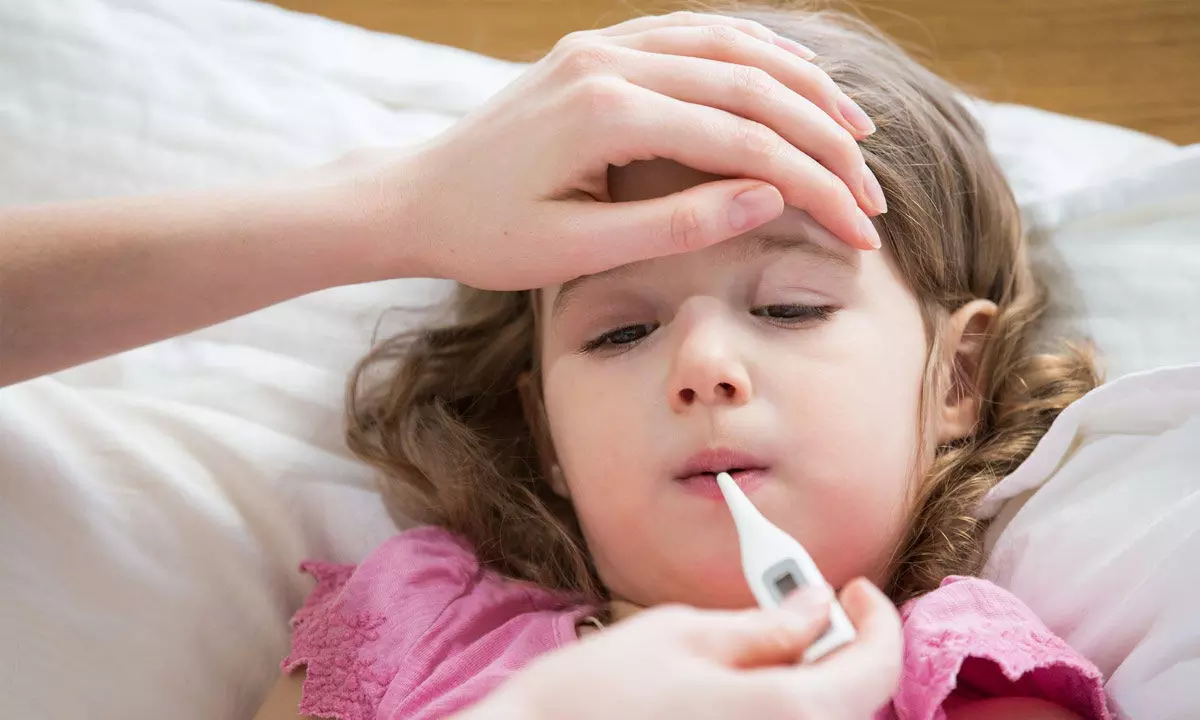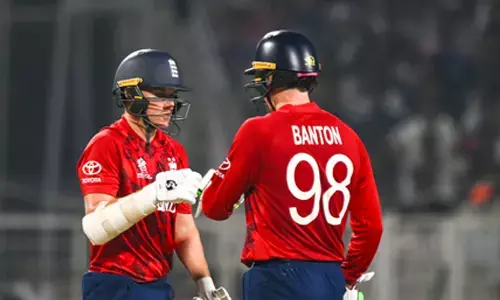Children with fever: Importance of fluids, electrolytes, and energy

Representational image
During the growing up years, fever in infants and children is one of the most common ailments
During the growing up years, fever in infants and children is one of the most common ailments. During fever, the child loses fluid along with electrolytes from the body through excessive sweating which may lead to dehydration. Dehydration during fever should not be taken lightly and can delay the recovery process.
Fever can lead to Dehydration in your child
Dehydration occurs when a person loses a significant amount of body fluids along with electrolytes, which can have an impact on normal bodily functions. Dr C Suresh Kumar, Professor of Pediatrics RVM Institute of Medical Sciences and Research Centre, Professor & HOD Pediatric & Neonatology, Apollo Cradle Hospital, Jublee Hills, Hyderabad shares the importance of fluids, electrolytes, and energy.
Electrolytes are minerals that carry an electric charge. Electrolytes play an important role in the proper functioning of multiple organs of the body like nerves, muscles, brain, and heart. Sodium and Chloride regulate the water levels in your body and acid-base balance. Calcium is involved in the contraction of muscles and the transmission of nerve impulses. Magnesium is involved in muscular contraction and relaxation as well as the release of chemical messengers for the transmission of nerve impulses.
With every degree Celsius increase in body temperature, fever causes fluid losses of more than 10%. A clinical study showed that over 25% of infants who visited the Pediatric Emergency Department due to fever were found to be dehydrated, and there was a strong link between dehydration and fever.
Why are children more prone to dehydration?
Dehydration can affect everyone, but certain individuals are more prone to it. Among these, infants and children are particularly vulnerable to dehydration. Due to their higher body surface area to volume ratio, children have a larger body surface to lose fluids through the skin when they have high fever. The body surface area to volume ratio is the total surface area of the body in proportion to body size or volume. A higher value of this ratio means higher skin or body exposure to the environment. Young children often struggle to communicate their thirst or drink water on their own which results in cases of dehydration.
What about energy deficits?
Children have higher metabolic needs, which makes them more susceptible to increased energy requirements and energy deficits. In addition, a child being unwell has a poor intake of food along with fluids which further makes them more susceptible to dehydration and energy deficit.
Impact of dehydration
Children with dehydration may show the following common symptoms in case of mild to moderate dehydration:
v Dry mouth/tongue
v Thirst
v Weakness/ tiredness, headache
v Dizziness
How to address the fluids, electrolytes, and energy losses in your child?
It is crucial to address fluid, electrolytes, and energy losses in children with fever as these deficits may have an impact on the speed of recovery for the child. Although water is essential for bodies and goes beyond simply satisfying thirst, it may not be enough to address the fluids and electrolytes deficit in fever. Therefore, maintaining a proper balance of fluids, electrolytes, and energy is essential for recovering from a fever.
Oral rehydration has been recommended for mild to moderate dehydration Fluid intake should be increased by 20% during fever episodes regardless of the underlying cause. Indian Academy of Pediatrics emphasises keeping the child well hydrated during fever as children may lose more fluids during fever.
For rehydration and energy needs, the child can consume clear homemade fluids, coconut water, and ready-to-drink formats containing electrolytes and energy.
These conventional rehydration methods like fruit juices contain more sugar and fewer electrolytes; the composition of coconut water is unreliable and there are variations in homemade preparations which may be inadequate to meet the requirements of fluid electrolytes and energy. It has been recommended that scientifically formulated fluids with electrolytes and energy can address these deficits and facilitate holistic recovery in children. As per Indian Expert Panel, Ready to Drink formats are preferable due to their quality standard and the known concentration of electrolytes, and energy contents as compared to variable home-made preparations. They also offer the benefits of hygienic packaging and better taste for children to improve the compliance.
To summarise, fever in children can lead to fluid electrolyte and energy losses which if not addressed can impact their recovery. It would be advisable to address these losses with scientifically formulated fluids with electrolytes and energy due to their known quality, convenience, accuracy, and taste.
It is recommended to consult a doctor when a child has a fever and to identify if the child is dehydrated showing signs like poor skin elasticity, dry tongue, dark-colored urine etc.








